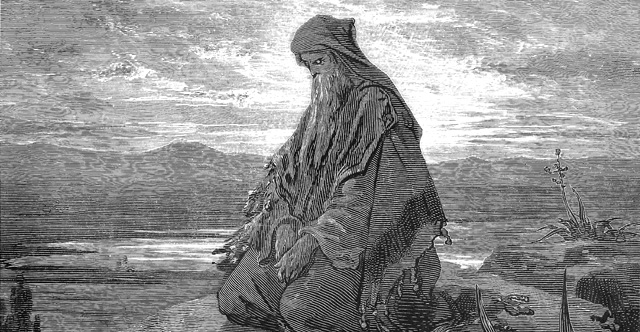
1
“
Where has your loved one gone, O most beautiful among women? Where has your loved one turned, that we may look for him with you?” The Woman
“¿Adónde se ha ido tu amado, Oh la más hermosa de las mujeres ? ¿Adónde se ha dirigido tu amado, Para que lo busquemos contigo?” LA ESPOSA:
2
“
My love has gone down to his garden, to the beds of spices. He has gone to feed his flock in the gardens and to gather lilies.
“Mi amado ha descendido a su huerto, A las eras de bálsamo, A apacentar su rebaño en los huertos Y recoger lirios.
3
I
am my love’s, and my love is mine, he who feeds his flock among the lilies.” The Fifth Song King Solomon
Yo soy de mi amado y mi amado es mío, El apacienta su rebaño entre los lirios.” EL ESPOSO:
4
“
You are as beautiful as Tirzah, my love, as beautiful as Jerusalem. You are to be feared as an army with flags.
“Eres hermosa como Tirsa, amada mía, Encantadora como Jerusalén, Imponente como un ejército con estandartes.
5
T
urn your eyes away from me, for they trouble me. Your hair is like a flock of goats that has come down from Gilead.
Aparta de mí tus ojos, Porque ellos me han confundido; Tu cabellera es como un rebaño de cabras Que descienden de Galaad.
6
Y
our teeth are like a flock of sheep which has come up from the washing. All of them give birth to two lambs at a time, and not one of them has lost her young.
Tus dientes son como rebaño de ovejas Que suben del lavadero, Todas tienen mellizas, Y ninguna de ellas ha perdido su cría.
7
T
he sides of your forehead are like a piece of a pomegranate behind your face-covering.
Tus mejillas son como mitades de granada Detrás de tu velo.
8
T
here are sixty queens, and eighty women kept who act like wives, and there are too many young women to number who have never had a man.
Sesenta son las reinas y ochenta las concubinas, Y las doncellas, sin número;
9
B
ut my dove, my perfect one, is special. She is her mother’s only daughter. She is the pure child of the one who gave birth to her. The young women saw her and knew she was honored. The queens and the women who act as wives praised her, saying,
Pero sin igual es mi paloma, mi perfecta, Es la hija única de su madre, La preferida de la que la dio a luz. Las doncellas la vieron y la llamaron bienaventurada, También las reinas y las concubinas, y la alabaron, diciendo:
10
‘
Who is this that looks out like the first light of day? She is as beautiful as the full moon, as pure as the sun. She is to be feared as an army with flags.’” The Woman
‘¿Quién es ésta que se asoma como el alba, Hermosa como la luna llena, Refulgente como el sol, Imponente como escuadrones abanderados ?’
11
“
I went down to the field of nut trees to see the flowers of the valley, to see if the vines or the pomegranates had flowers.
Descendí al huerto de los nogales Para ver el verdor del valle, Para ver si la vid había retoñado, Si los granados habían florecido.
12
B
efore I knew it, I wanted to be over the war-wagons of the princes of my people.” Women of Jerusalem
Sin que me diera cuenta, mi alma me colocó Sobre los carros de mi noble pueblo.” EL CORO:
13
“
Return, return, O Shulammite! Return, return, that we may look upon you!” The Woman “Why should you look upon the Shulammite, as upon a dance in front of two armies?”
“¡Regresa, regresa, oh Sulamita; Regresa, regresa, para que te contemplemos!” EL ESPOSO: “¿Por qué han de contemplar a la Sulamita, Como en la danza de los dos coros?
 English
English
 Albanian - Shqip
Albanian - Shqip
 Arabic - العربية
Arabic - العربية
 Bulgarian - Български
Bulgarian - Български
 Chinese - 汉语
Chinese - 汉语
 English - English
English - English
 French - Français
French - Français
 German - Deutsch
German - Deutsch
 Italian - Italiano
Italian - Italiano
 Māori - Te Reo Māori
Māori - Te Reo Māori
 Portuguese - Português
Portuguese - Português
 Romanian - Română
Romanian - Română
 Russian - Русский
Russian - Русский
 Somali - Af Soomaali
Somali - Af Soomaali
 Spanish - Español
Spanish - Español
 Ukrainian - Українська
Ukrainian - Українська
 Vietnamese - Tiêng Viêt
Vietnamese - Tiêng Viêt
 Spanish
Spanish
 Albanian - Shqip
Albanian - Shqip
 Arabic - العربية
Arabic - العربية
 Bulgarian - Български
Bulgarian - Български
 Chinese - 汉语
Chinese - 汉语
 English - English
English - English
 French - Français
French - Français
 German - Deutsch
German - Deutsch
 Italian - Italiano
Italian - Italiano
 Māori - Te Reo Māori
Māori - Te Reo Māori
 Portuguese - Português
Portuguese - Português
 Romanian - Română
Romanian - Română
 Russian - Русский
Russian - Русский
 Somali - Af Soomaali
Somali - Af Soomaali
 Spanish - Español
Spanish - Español
 Ukrainian - Українська
Ukrainian - Українська
 Vietnamese - Tiêng Viêt
Vietnamese - Tiêng Viêt
